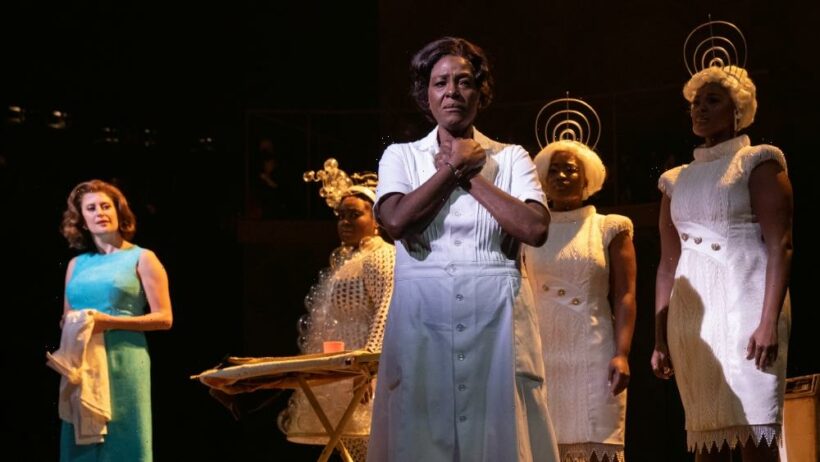The musical “Caroline, or Change” is back on Broadway for the first time since its captivating original production closed in 2004. The best theater revivals highlight the relevance of classic works for new audiences, and the Roundabout Theatre Company’s new production of the beloved Tony Kushner and Jeanine Tesori musical is certainly timely. It’s also necessary.
In this production directed by Michael Longhurst, audiences are introduced to Fly Davis’ eye-catching set design even before the show begins. A statue of a soldier holding a confederate flag stands prominently center stage surrounded by tall stalks of wheat and green grass. An inscription at the soldier’s feet does not offer a name, but simply reads, “The Southern Defenders 1861-1865.”
That statue immediately brings to mind contemporary controversies around similar monuments, including recent calls for the removal of the actual South Defenders Monument in Lake Charles, La. — the setting of “Caroline, or Change” — because of its reminders of slavery. These current realities inform a musical first presented almost 20 years ago and set in 1963, during a time of upheaval and change: President John F. Kennedy has been assassinated, and it’s the height of the civil rights movement. Davis’ design ensures the audience is aware of the show’s historical context, and of its ongoing relevance, from the start.
Underground, in the Gellman family basement, the story of an underpaid, illiterate, divorced and unhappy middle-aged Black maid, Caroline Thibodeaux (Sharon D. Clarke), unfolds. Clarke, who won an Olivier Award for her performance in the role, does angry well. Her misery can be seen in her face through every grimace and puff of her cigarette, and in her stance with every hard flinch. Smiles are few and far between, only appearing at the thought of a rendezvous with Nat King Cole or at the Motown-like music that comes alive through her radio (gorgeously personified by performers Nasia Jackson, Nya and Harper Miles).
Caroline complains about working as a maid at the age of 39, but believes she has no other options. Her hopelessness, depression and general self-destructive outlook are presented empathetically, but can feel like an overdone storyline. What isn’t brought to light as clearly is the way that Caroline’s behavior can be seen as an echo of the trauma of slavery, manifesting as a lack of self-esteem and persistent feelings of anger. Theatergoers, without this context, might just dismiss her as another angry Black woman.
Bringing a little zest into Caroline’s life is her conscience, both good and bad, depicted through household appliances. The Washing Machine (Arica Jackson) is a bubbly delight. She serves as a reminder that Caroline’s chores are just about finished, but the hot and steamy Dryer (Kevin McAllister) brings her back to reality and reminds her of the hell she is mentally living in. Costumes designed by Davis give these anthropomorphized objects bright glitzy colors and rich textures that amplify her minimalistic set design.
Caroline’s employers, the Gellman family, are Jewish and white presenting. The father, Stuart Gellman (John Cariani), has recently remarried but remains emotionally detached, still mourning the premature death of his first wife. Stuart’s new spouse, Rose Stopnick Gellman (an honest and believable Caissie Levy), serves Caroline microaggressions in a Pyrex dish. Though she is Jewish, she has bought into the white American middle-class dream of life with a Black maid — giving leftovers and unwanted things to Caroline as a sign of “friendship” instead of actual support as a person from another discriminated group. Stuart’s young son, Noah (Gabriel Amoroso at the performance this critic saw), is caught between the family he was born into and Caroline’s family, which he dreams about being a part of.
The word “change” takes on multiple meanings in “Caroline, or Change.” One moment it’s indicative of the loose coins Caroline finds in pants pockets while doing laundry; another moment it reveals the life transition she is afraid of. Caroline’s daughter Emmie (Samantha Williams), however, fiercely serves as this story’s change agent. She’s instrumental in helping her mother revaluate her antiquated beliefs and works to fight the systems that had her mother believing them in the first place. Williams delicately conquers a role that previously secured Anika Noni Rose her first Tony Award, making this role her own with a youthful energy and gentle grace.
All of these story elements spun together wrestle with issues that are still urgent today. As one memorable lyric in the show states, there is “no underground in Louisiana.” But on the surface in New York City, there is an important musical revival on Broadway that is deeply meaningful, crucial to experience and definitely a necessary change.
Source: Read Full Article
